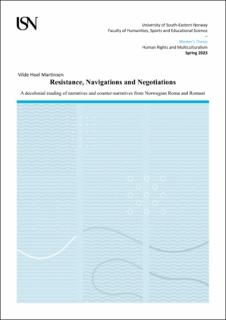| dc.description.abstract | In Norway today, Roma and Romani are often omitted or given little space in history books as well as in the news. When they at long last are mentioned, they tend to appear negatively. The way Roma and Romani are portrayed in the media perpetuates narratives, which become dominant discourses about them, confirmed by society at large. These narratives are constructed by stereotypes which are rooted in attitudes that follow after the establishment of the modern-colonial nation-state. In this study, I analyze different personal narratives from Norwegian Roma and Romani from the Norwegian mass-media discourse. The narratives reveal various approaches to navigating, negotiating and resisting dominant discourses about them. My desire is to contribute to awareness around previous and ongoing oppression of Roma and Romani in Norway by highlighting their perspectives with reference to how they show agency through their personal narratives.
I will answer the research questions within the scope of two themes I have identified emerging as the most prevalent in my sample of narratives: ‘Roma and Romani in relation to child-rearing” and “Roma and Romani’s relation to the Norwegian school system.” The research questions are analyzed by utilizing counter-narratives as methodological framing within a Foucaultian and decolonial narrative tradition as an approach to Critical Discourse Analysis (CDA). This approach is applied in order to analyze their personal narratives as well as identify possible counter-narratives.
Inspired by the prominent thinker Boaventura de Sousa Santos, I take on a decolonial approach. By applying Stanos theory, the ‘sociology of absences’ I seek to analyze how Roma and Romani express experiences of being made absent with their ways of knowing and their own perspectives through dominant discourses about them. Furthermore, I apply his theory, the “sociology of emergences” to make visible, and engage with, their perspectives and ways of knowing. I argue, in line with Santos, that there is an equal need for the majority as well as those who are most immediately affected by colonial violence, to recognize that we all live under a colonial system, and that it is significantly important for the majority to counter coloniality through dismantling epistemic injustice. | |
